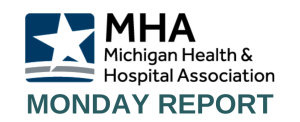
The MHA released a new episode of the MiCare Champion Cast, which features interviews each month with experts in Michigan discussing key issues that impact healthcare and the health of communities.
The November 2023 episode, released on National Rural Health Day, features Small and Rural Hospital Council Chair Peter Marinoff, president and CEO of Munson Healthcare’s (MHC) Southern Region. Marinoff is joined by Lauren LaPine, senior director of legislative and public policy at the MHA.
Marinoff, who joined MHC in 1999, currently oversees Munson Healthcare Cadillac Hospital, Manistee Hospital and Paul Oliver Memorial Hospital in Frankfort. LaPine, in addition to overseeing the Small and Rural Hospital Council, serves as staff secretary to the MHA’s Behavioral Health Integration Council and Public Health Task Force.
Throughout the episode, Marinoff and LaPine explore the unique challenges facing Michigan’s rural hospitals; what rural issues are being prioritized at the state and federal level; how MHC is prioritizing the well-being of their workforce and communities; and how decision-makers can support rural communities.
While discussing the behavioral health needs of rural residents, Marinoff details MHC’s work with the Regional Community Health Opioid Initiative, which was featured in the MHA’s 2023 Community Benefit Report. The program improves access to Substance Use Disorder treatment and resources while addressing stigma, ensuring safe prescribing and educating patients and providers.
MHA CEO Brian Peters also released a statement for National Rural Health Day celebrating the work of Michigan’s small and rural hospitals and health systems, where teams are often tasked with caring for some of the state’s most vulnerable patients with less resources than their urban counterparts.
The episode is available to stream on Spotify, YouTube, Apple Podcasts and SoundCloud. Questions or idea submissions for future MiCare Champion Cast episodes can be sent to Lucy Ciaramitaro at the MHA. To learn more about small and rural health efforts at the MHA, visit the rural health webpage or contact Lauren LaPine at the MHA.




















